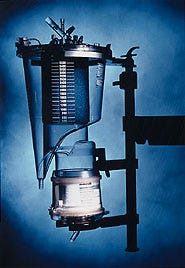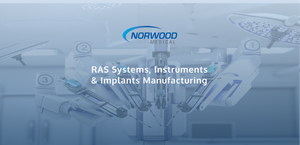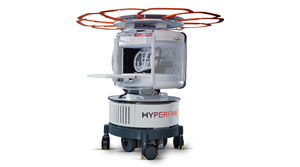November 1, 1997
Polycarbonate Material Meets Critical Needs of Heart Surgery Device
Provides reliability, biocompatibility, and sterilizability
When a product will be serving as the lungs of a patient during heart surgery, there is zero tolerance for material failure. Therefore, in designing the components for its Maxima Forté oxygenator, Hardshell venous reservoir, and arterial filter, Minneapolis-based Medtronic Inc. needed a material suitable for the critical functions of these products. The manufacturing processes for the reservoir and oxygenator each include more than 30 steps. In addition to traditional injection molding, the components undergo ultrasonic welding, urethane potting, adhesive bonding, pad printing, and insert molding. The oxygenator and reservoir are EtO sterilized, while the filter can be sterilized by either EtO or gamma radiation. The chosen material would have to withstand all of these processes without degradation.

The company selected Makrolon 2558 polycarbonate made by Bayer Corp.'s Polymers Div. (Pittsburgh). "Sterilizability, ease of processing, biocompatibility, and clarity" were some of the key characteristics of the Bayer polycarbonate, according to Robert Gremel, oxygenator project manager for Medtronic.
Medtronic used a supercomputer to determine the product shapes that would optimize the blood flow path. The results were unusual geometries with deep draws and numerous curves. Most challenging was the design of the reservoir, whose six-component assembly measures 11 X 16 in., with a snout-shaped lower end. The oxygenator, which also has six separate polycarbonate components, measures 41Ž2 X 61Ž2 in., while the two-component arterial filter is 3 X 5 in. Wall thicknesses range from 0.60 to 0.85 in.
Medtronic and Bayer paid special attention to reducing molded-in stress in order to prevent breakage. Bayer's design support staff assisted throughout the design process, mold-flow analysis, and actual processing. "With Bayer's help, the components came out of the molds with low in-molded stress and free of visual cosmetic defects common to parts of this size," said Mike Van Driel, Medtronic's project engineer for the Forté Hardshell reservoir program.
The parts have passed propylene carbonate testing at 400 psi, according to Gremel, representing a "well-controlled molding process and material quality." In addition to the 2558 polycarbonate, Medtronic is also qualifying Bayer's Makrolon DP1-1452 for all three Class III medical devices.
For more information on Makrolon polycarbonates from Bayer Corp.'s Polymers Div., call 412/777-2000.
You May Also Like


